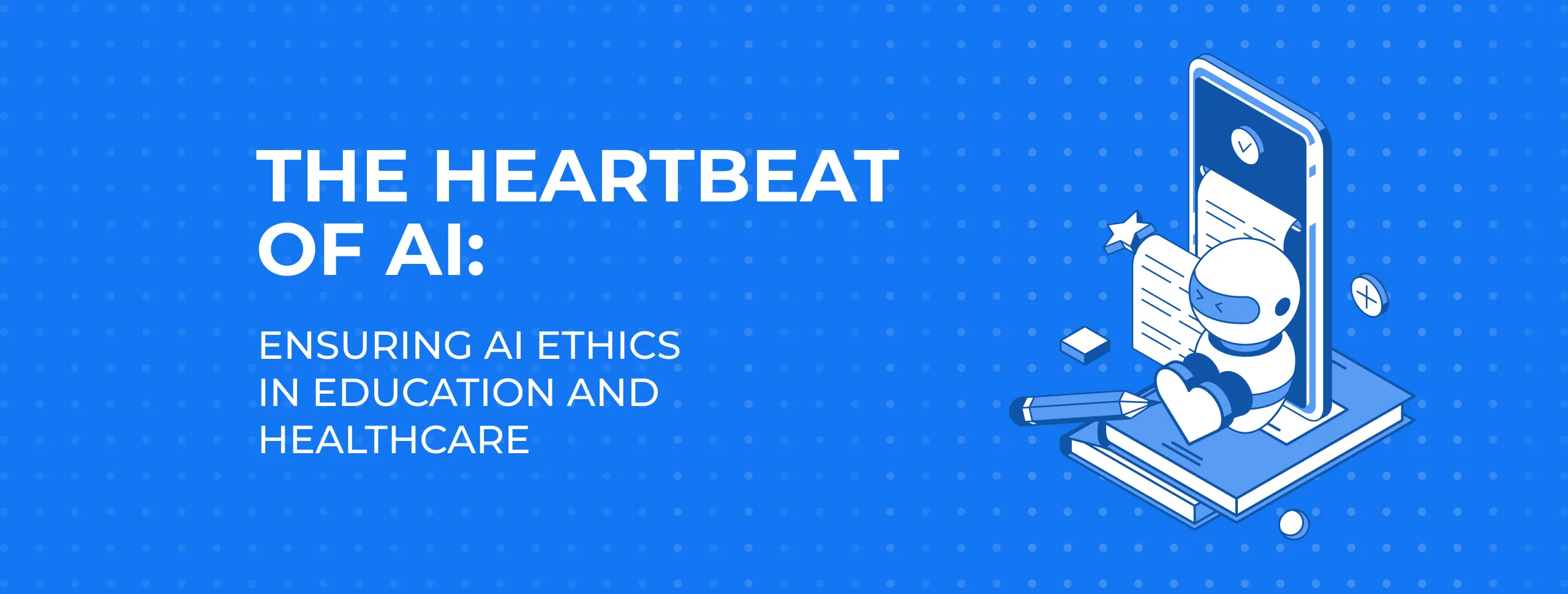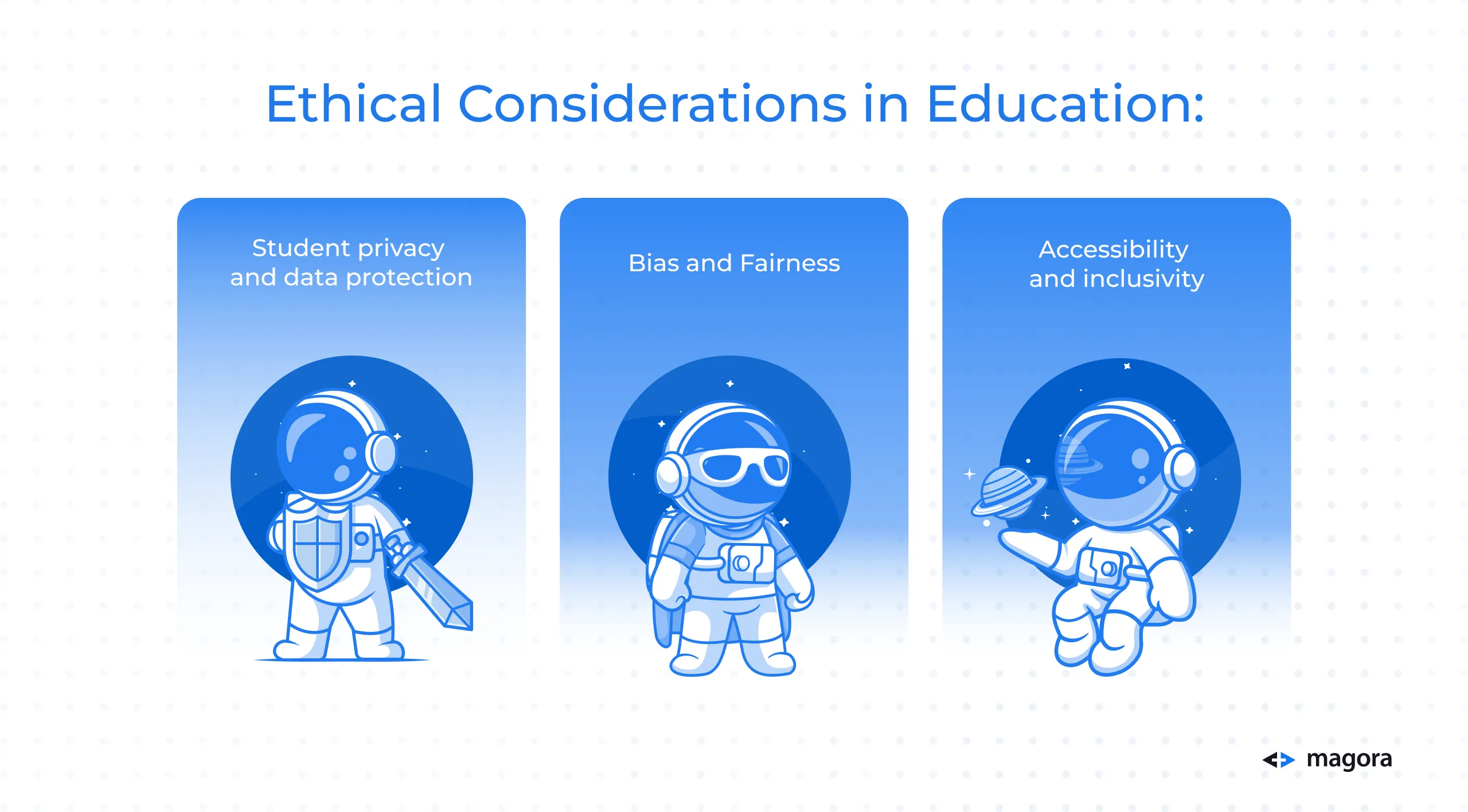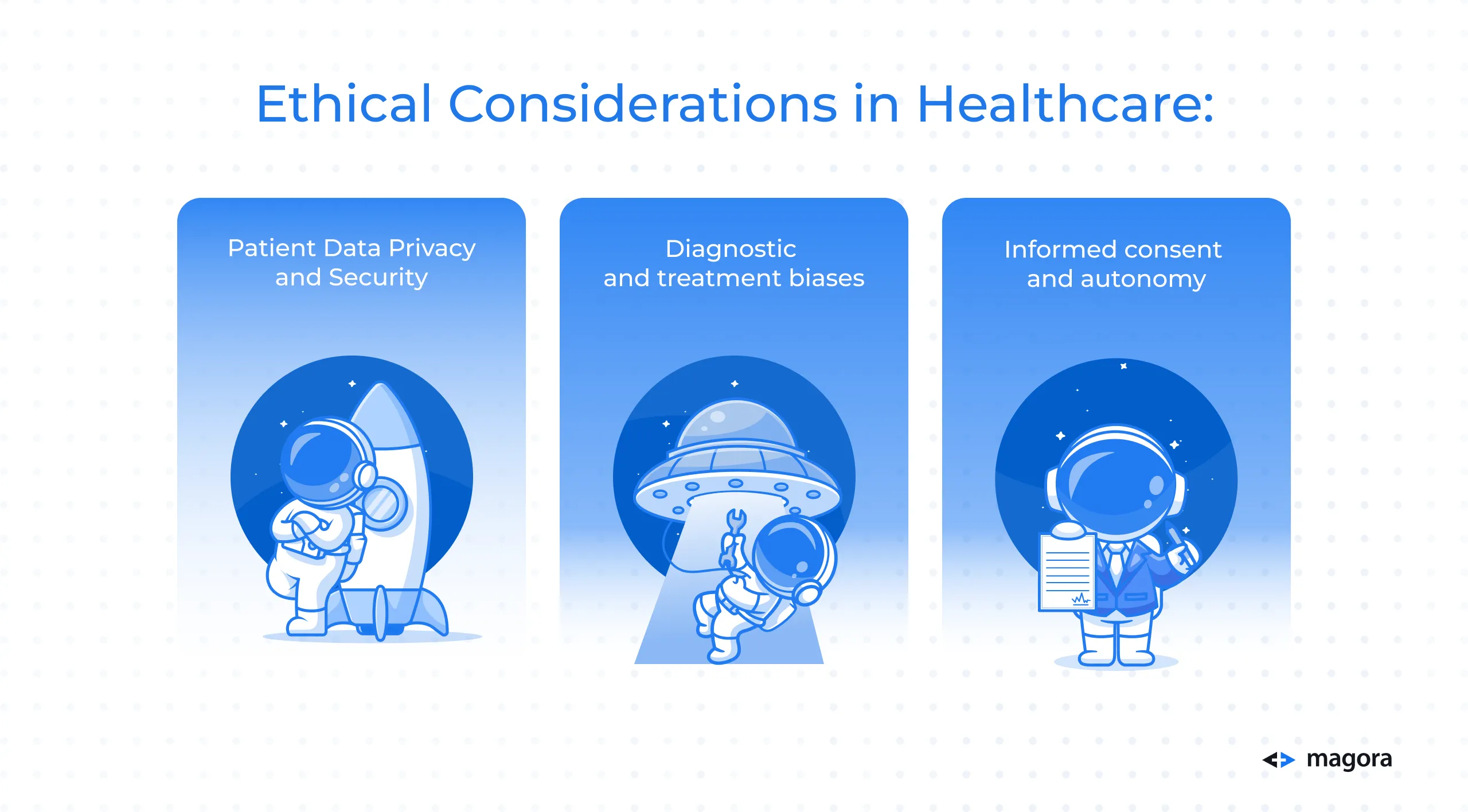
The Heartbeat of AI: Ensuring AI Ethics in Education and Healthcare

Table of contents
- The integration of AI in education and healthcare
- The importance of ethical considerations in AI development
- Ethical Considerations in Education
- Ethical Considerations in Healthcare
- AI software development case studies
- AI software development and implementation
- How to take an ethical approach in AI software development
- Magora AI development services
- The importance of ongoing dialogue and collaboration for responsible AI development
- Conclusion
The integration of Artificial Intelligence (AI) with education and healthcare is reshaping the way we learn and receive treatment. Reminiscent of cinematic portrayals in "Matrix" and "Her," where AI blurs reality, we stand at the nexus of promise and uncertainty: AI offers efficiency and innovation while raising significant ethical considerations.
The collaboration between AI and key sectors, facilitated by leading companies that provide AI development services in the United Kingdom, is revolutionising our everyday lives, from intelligent tutoring systems to diagnostic algorithms, AI applications present extraordinary opportunities if we mitigate the simultaneous challenges well.
In this article we will delve into the ethics of AI, explore its role in shaping education and healthcare, look at AI web development in the United Kingdom, AI mobile app development in the United Kingdom, and navigate the intersection of technological progress and societal values to seek insights and solutions.
The integration of AI in education and healthcare
In recent years, AI has revolutionised classrooms and healthcare settings, providing a wide range of tools to improve learning and patient care. While learning institutions harness AI for education, including personalised learning capabilities, adaptive assessments, and streamlined administration, AI for healthcare encompasses areas such as diagnostic assistance, treatment optimisation, and effective data handling.
As AI becomes increasingly integrated, however, it raises important ethical considerations that demand careful attention.
The importance of ethical considerations in AI development
The potential risks of bias, privacy infringement, and unintended consequences underscore the need for a conscientious and cautious approach to AI implementation.
In education, ethical dilemmas arise concerning fairness, transparency, and the preservation of human-centric teaching methods. In healthcare, ethical considerations centre on safeguarding patient privacy, ensuring diagnostic accuracy, and maintaining the complementary role of AI alongside human expertise. Addressing these ethical challenges is not merely a moral obligation but also essential for building trust in AI technologies and maximising their positive societal impact.
In the subsequent sections of this article, we take a closer look at each sector, the ethical challenges that must be considered, and suggest best practices to mitigate disaster.
Ethical Considerations in Education
While it seems that AI and education go hand-in-hand, there are ethical considerations that must be broached. The following AI in education examples highlight the pros, potential risks, and best practices.

Student privacy and data protection
Collection and use of student data
Educational institutions and AI platforms often gather extensive data on students, encompassing academic performance, attendance, and behavioural patterns within digital learning environments. This acquisition and utilisation of student data by AI prompts significant ethical inquiries, including how it will be used, where it will be shared and who can gain access to it. It is crucial that institutions employing AI adhere to best practices to safeguard sensitive information, ensuring secure storage and limited access to data.
Potential risks and consequences
Unauthorised access, misuse, or insecure storage of student data can result in severe consequences such as identity theft, privacy breaches, and the formation of profiles that could impact a student’s future opportunities or experiences.
Best practices for safeguarding student privacy
Implementing robust encryption measures, access controls, and anonymisation of personally identifiable information are essential steps, as are transparent communication with students, parents, and educators about data collection practices and pathways to obtaining explicit consent.
Bias and Fairness in Educational AI
Addressing Biases in Algorithms
Mitigating biases in algorithms is crucial for ensuring fair representation and opportunities for all students; AI-driven grading systems or personalised learning algorithms may inadvertently favour certain demographics, requiring ongoing efforts to recognise and mitigate biases. It is important to champion transparent decision-making processes that contribute to fostering trust between educators, students, and AI systems.
Ensuring fair representation and opportunities for all students
Educational AI should be designed to accommodate the diverse backgrounds, abilities, and experiences of students. Once again, ensuring fair representation in training data and adjusting algorithms to avoid favouring specific demographics is imperative for providing equal opportunities.
Transparency in AI decision-making processes
Transparent AI systems in education are essential for building trust. Providing clear explanations of how algorithms make decisions, particularly in areas like personalised learning paths or grading systems, fosters understanding among students, educators, and stakeholders.
Accessibility and inclusivity
The importance of addressing challenges related to diverse needs
Differently abled students may encounter barriers in traditional educational settings. AI can play a crucial role in addressing these challenges by developing tools such as speech-to-text applications, adaptive learning technologies, and other assistive technologies tailored to individual needs.
Designing AI solutions catering to diverse learning needs
Educational AI should be designed to cater to various learning styles and preferences. This inclusivity can be achieved through adaptive technologies that adjust content delivery, personalized learning paths, and features accommodating diverse learning needs, thereby fostering an inclusive learning environment.
Sal Khan, a visionary in the realm of education and the driving force behind Khan Academy, envisions a future where artificial intelligence ignites an unprecedented revolution in learning. With a steadfast belief in the transformative power of AI, he propels us into a realm where students and educators seamlessly collaborate with advanced tools. Imagine a world where every student has their own personal AI tutor and every teacher is supported by an AI teaching assistant.
Ethical Considerations in Healthcare
AI and healthcare are increasingly becoming a dream team; however, ethical considerations should not be ignored. The following AI in healthcare examples highlight best practices across a range of scenarios and applications.

Patient Data Privacy and Security
Safeguarding sensitive health information
In the healthcare landscape, AI applications heavily rely on vast amounts of sensitive patient data. It is vital to prioritise measures such as encryption, secure storage, and restricted access to protect patients from potential data breaches.
Legal and regulatory frameworks for healthcare data
Compliance with legal and regulatory standards, such as the Health Insurance Portability and Accountability Act (HIPAA) in the US, is crucial for ensuring the protection of patient data. Adherence to these frameworks is essential for upholding patient trust and avoiding legal ramifications.
Building trust with patients through transparent data practices
Transparency regarding the collection, use, and sharing of patient data is essential. Healthcare providers and AI developers must engage in clear communication with patients about data practices, fostering transparency and trust in the utilisation of AI technologies in their healthcare journey.
Diagnostic and treatment biases
Recognising and mitigating biases in AI-driven diagnostics
To ensure equitable and precise outcomes in healthcare, addressing biases in AI-driven diagnostics is paramount. While AI systems present significant advancements, they may inadvertently perpetuate or introduce biases that compromise diagnostic accuracy and subsequent treatment decisions.
A proactive approach involves ongoing efforts to identify and mitigate biases within AI algorithms. This necessitates thorough scrutiny and validation of training data to detect any skewed patterns. By incorporating diverse and representative datasets and conducting regular algorithm audits, the risk of biased outcomes can be minimised.
Striking a balance between technological capabilities and human expertise is essential. Human oversight plays a critical role in interpreting complex medical cases, considering contextual nuances, and questioning AI outputs. Collaborative partnerships between AI systems and healthcare professionals facilitate a holistic approach, harnessing the strengths of both technology and human judgment.
Ensuring unbiased treatment recommendations
Imperative beyond diagnostics to prevent disparities in patient care, scrutinising AI algorithms for biases is essential to avoid preferential treatment patterns or favouritism towards specific demographic groups.
Implementing stringent validation protocols for treatment algorithms is crucial to identify and rectify biases effectively. This process involves assessing the algorithm's impact across diverse patient populations to promote equitable outcomes. Regular updates and adjustments based on real-world performance are essential for ongoing improvement and bias reduction.
Balancing technological advancements with human expertise
Essential to comprehensive patient care, while AI systems excel in processing data rapidly, human clinicians bring invaluable insights, empathy, and contextual understanding to decision-making.
Facilitating collaboration among AI developers, healthcare professionals, and ethicists is crucial. Continuous training programs for medical practitioners in AI usage enhance their ability to assess and interpret AI-generated insights critically. This collaboration ensures seamless integration of technology into healthcare workflows while mitigating the risk of biased outcomes.
Informed consent and autonomy
The role of AI in healthcare decision-making
The role of AI in decision-making should be communicated clearly to patients. Respecting patient autonomy involves ensuring they have a comprehensive understanding of AI-assisted treatments. Informed consent should extend to such treatments, with patients actively participating in decisions regarding their healthcare.
Ensuring patients have a clear understanding of AI-assisted treatments
To uphold the principles of informed consent, healthcare providers must go beyond merely acknowledging the use of AI and ensure that patients have a clear understanding of how AI technologies will impact their diagnosis, treatment, and overall care.
Implementing educational initiatives that demystify AI, its capabilities, and potential implications is vital. By providing accessible and digestible information, healthcare professionals can empower patients to make informed choices regarding such treatments.
Respecting patient autonomy and preferences
Respecting patient autonomy involves embracing shared decision-making models. Healthcare providers should actively engage patients in discussions about AI-assisted treatments, allowing them to express preferences and concerns.
Acknowledging and respecting diverse patient preferences is essential. Some patients may prefer a more hands-on approach in decision-making, while others may opt for a more trust-based relationship with healthcare providers. Tailoring communication and involvement strategies to individual preferences ensures a patient-centred approach.
In the ever-evolving landscape of healthcare, few topics captivate attention quite like the integration of Artificial Intelligence (AI) into patient care and the workplace. Recently, at UC Davis Health, two leading minds convened to delve into the trajectory of AI in healthcare. CEO David Lubarsky and Chief AI Advisor Dennis Chornenky engaged in a dynamic discussion, shedding light on the current trends, the intricate dance between human intellect and artificial intelligence, the hurdles confronting AI adoption in healthcare, and its potential to bolster health equity and outcomes. As the conversation unfolded, it became evident that the fusion of AI and healthcare holds immense promise, yet requires nuanced navigation to realize its full potential.
AI software development case studies
Ethical considerations surrounding healthcare records ownership and patient history sharing are paramount. Questions arise about responsible information sharing, recipient determination, timing, and consent necessity, striking a balance between data utilisation and safeguarding against misuse.
In drug development, the integration of AI promises streamlined processes. AI's potential in drug discovery, leveraging data processes, robotics, and genetic models, offers ground-breaking advancements in patient recovery. However, debates persist on the adequacy of current legal frameworks in addressing AI's influence in healthcare and patient protection.
The amalgamation of AI into healthcare poses ethical dilemmas, including informed consent, safety, transparency, algorithmic fairness, biases, and data privacy. Achieving a delicate balance between innovation and ethical responsibility is crucial in navigating the transformative landscape of AI in healthcare.
Da Vinci technology stands as a remarkable case in point, revolutionizing medical imaging and surgical procedures through robotics, AI, and advanced equipment integration. Named after Leonardo da Vinci, this platform symbolises precision and advancement in medical science.
AI software development and implementation
Let’s look at some of the core AI technologies shaping tomorrow’s healthcare industry.
Machine Learning (ML) – Neural Networks and Deep Learning
ML involves the development of algorithms and models that enable computers to learn from data and make predictions or decisions without explicit programming. Neural networks and deep learning are subsets of ML that use interconnected layers of nodes (artificial neurons) to simulate the human brain's structure.
These technologies are crucial for tasks such as diagnosing diseases from medical images, predicting patient outcomes, and personalising treatment plans based on individual patient data. They excel at handling complex, non-linear relationships within large datasets.
Natural Language Processing (NLP)
NLP is a branch of AI that focuses on the interaction between computers and human language. It enables machines to understand, interpret, and generate human-like text.
Essential for extracting valuable information from unstructured clinical notes, medical literature, and patient records, NLP helps out with tasks including automating medical transcription, information extracting, and sentiment analysis in healthcare communications.
Rule-Based Expert Systems
Rule-based expert systems are AI systems that use predefined rules and knowledge to make decisions or solve problems within a specific domain. These systems follow logical reasoning and if-then rules to provide expert-level advice.
In healthcare, these systems can assist in diagnosis, treatment planning, and decision support. They leverage established medical knowledge and guidelines to provide quick and consistent recommendations, making them valuable tools for healthcare professionals.
Physical Robots
Physical robots in healthcare are autonomous or semi-autonomous machines designed to perform tasks that would traditionally require human intervention. These can range from surgical robots to assistive devices for patient care.
Physical robots enhance precision in surgeries, provide telepresence for remote medical consultations, and assist in routine tasks such as medication delivery or patient monitoring. They contribute to improved efficiency and patient outcomes.
Robotic Process Automation (RPA)
RPA involves the use of software robots or "bots" to automate repetitive and rule-based tasks traditionally performed by humans.
RPA is employed in healthcare for automating administrative processes, billing, and data entry, allowing healthcare professionals to focus more on patient care. It enhances efficiency, reduces errors, and streamlines workflow in various administrative tasks within healthcare organisations.
As a leading Artificial Intelligence app development company in the United Kingdom, Magora has successfully developed AI solutions that empower businesses to make intelligent decisions, automate processes, and leverage data-driven insights. From NLP and ML algorithms to computer vision and predictive analytics, the company’s AI expertise spans a wide range of domains.
Read about our work with Focalyx, a leading medical AI software provider, here.
How to take an ethical approach in AI software development
In AI software development, ethical considerations should take precedence, with an emphasis on transparency in system capabilities and data usage.
Prioritise fairness, privacy, and security, while nurturing accountability and diversity within the development team. Centre efforts on human-centric design principles, regulatory compliance, and ongoing monitoring, while incorporating ethical AI frameworks and actively engaging with the public to address concerns and champion responsible AI development.
Magora AI development services
Magora, a leading AI app development company in the United Kingdom, takes an ethical approach to AI app development by implementing a set of principles and practices that prioritise the responsible and fair use of AI. This commitment is reflected in the following key aspects:
Transparency
Magora is dedicated to providing clear and understandable information about the AI algorithms and data usage within their applications. Users and stakeholders are informed about how the AI system operates and impacts their experience.
Data Privacy
The company prioritises the protection of user data, adhering to strict privacy policies and compliance with relevant regulations. Magora implements robust security measures to safeguard sensitive information, ensuring that AI applications handle data responsibly.
Bias Mitigation
Magora actively addresses biases in AI algorithms to prevent discrimination and ensure fair treatment. They employ techniques to identify and eliminate biases during the development process, promoting inclusivity and avoiding negative impacts on different user groups.
User Empowerment
Magora emphasises user empowerment by providing settings and controls that allow users to understand and manage the AI features in their applications. This includes options for customisation and transparency in decision-making processes.
Continuous Monitoring and Evaluation
Magora implements mechanisms for ongoing monitoring and evaluation of AI systems. Regular assessments are conducted to identify and rectify any ethical concerns or performance issues that may arise during the application's lifecycle.
The importance of ongoing dialogue and collaboration for responsible AI development
Magora recognises the significance of continuous dialogue and collaboration in fostering responsible AI development. This approach involves ongoing communication and cooperation among various stakeholders, including developers, users, regulatory bodies, and ethicists. The following points highlight the importance of this collaborative approach:
User-Centric Design
Regular dialogue with end-users allows Magora to understand their needs, concerns, and expectations. This user-centric design approach ensures that AI applications align with user values and preferences, contributing to positive user experiences.
Ethical Guidance
Collaboration with ethicists and experts in AI ethics provides valuable insights and guidance. Magora engages in ongoing discussions to stay updated on evolving ethical standards and best practices, incorporating these insights into their development processes.
Regulatory Compliance
Continuous collaboration with regulatory bodies helps Magora stay abreast of legal requirements and industry standards related to AI. This proactive engagement ensures that their AI applications comply with ethical guidelines and legal frameworks.
Adaptability
The dynamic nature of AI technology requires continuous adaptation to new challenges and ethical considerations. Ongoing collaboration allows Magora to respond promptly to emerging ethical concerns, integrating changes and improvements into their AI development practices.
Educational Initiatives
As AI software development in the United Kingdom becomes increasingly popular, Magora emphasises educational initiatives to raise awareness about AI ethics among both developers and users. By fostering a shared understanding of ethical considerations, they contribute to a more informed and responsible AI ecosystem.
Conclusion
The positive impact on education and healthcare that AI is having as it is increasingly integrated is phenomenal; however, to ensure ongoing best practice, ethical considerations are paramount. As we navigate the intersection of artificial intelligence with these vital societal sectors, responsible integration is essential for meaningful progress.
Collaborative efforts among AI developers, educators, healthcare professionals, and the wider community are key to ensuring that AI acts with integrity, empathy, and a commitment to individual and community wellbeing.
The increasing demand for Artificial Intelligence development services in the United Kingdom highlights the pivotal role of specialised companies like Magora. Proficient in Artificial Intelligence app development, web development, mobile app development, and software development, these firms shape the future of transformative technologies.





